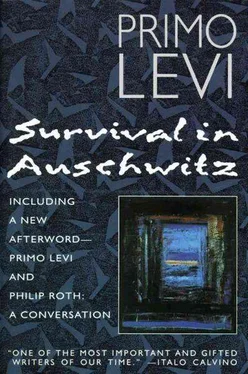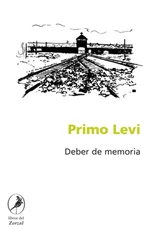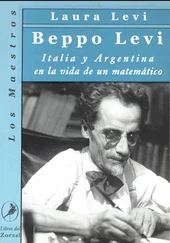And night came, and it was such a night that one knew that human eyes would not witness it and survive. Everyone felt this: not one of the guards, neither Italian nor German, had the courage to come and see what men do when they know they have to die.
All took leave from life in the manner which most suited them. Some praying, some deliberately drunk, others lustfully intoxicated for the last time. But the mothers stayed up to prepare the food for the journey with tender care, and washed their children and packed the luggage; and at dawn the barbed wire was full of children’s washing hung out in the wind to dry. Nor did they forget the diapers, the toys, the cushions and the hundred other small things which mothers remember and which children always need. Would you not do the same? If you and your child were going to be killed tomorrow, would you not give him to eat today?
In hut 6A old Gattegno lived with his wife and numerous children and grandchildren and his sons- and daughters-in-law. All the men were carpenters; they had come from Tripoli after many long journeys, and had always carried with them the tools of their trade, their kitchen utensils and their accordions and violins to play and dance to after the day’s work. They were happy and pious folk. Their women were the first to silently and rapidly finish the preparations for the journey in order to have time for mourning. When all was ready, the food cooked, the bundles tied together, they unloosened their hair, took off their shoes, placed the Yahrzeit candles on the ground and lit them according to the customs of their fathers, and sat on the bare soil in a circle for the lamentations, praying and weeping all the night. We collected in a group in front of their door, and we experienced within ourselves a grief that was new for us, the ancient grief of the people that has no land, the grief without hope of the exodus which is renewed every century.
Dawn came on us like a betrayer; it seemed as though the new sun rose as an ally of our enemies to assist in our destruction. The different emotions that overcame us, of resignation, of futile rebellion, of religious abandon, of fear, of despair, now joined together after a sleepless night in a collective, uncontrolled panic. The time for meditation, the time for decision was over, and all reason dissolved into a tumult, across which flashed the happy memories of our homes, still so near in time and space, as painful as the thrusts of a sword.
Many things were then said and done among us; but of these it is better that there remain no memory.
With the absurd precision to which we later had to accustom ourselves, the Germans held the roll-call. At the end the officer asked ‘Wieviel Stück?’ The corporal saluted smartly and replied that there were six hundred and fifty ‘pieces’ and that all was in order. They then loaded us on to the buses and took us to the station of Carpi. Here the train was waiting for us, with our escort for the journey. Here we received the first blows: and it was so new and senseless that we felt no pain, neither in body nor in spirit. Only a profound amazement: how can one hit a man without anger?
There were twelve goods wagons for six hundred and fifty men; in mine we were only forty-five, but it was a small wagon. Here then, before our very eyes, under our very feet, was one of those notorious transport trains, those which never return, and of which, shuddering and always a little incredulous, we had so often heard speak. Exactly like this, detail for detail: goods wagons closed from the outside, with men, women and children pressed together without pity, like cheap merchandise, for a journey towards nothingness, a journey down there, towards the bottom. This time it is us who are inside.
Sooner or later in life everyone discovers that perfect happiness is unrealizable, but there are few who pause to consider the antithesis: that perfect unhappiness is equally unattainable. The obstacles preventing the realization of both these extreme states are of the same nature: they derive from our human condition which is opposed to everything infinite. Our ever-insufficient knowledge of the future opposes it: and this is called, in the one instance, hope, and in the other, uncertainty of the following day. The certainty of death opposes it: for it places a limit on every joy, but also on every grief. The inevitable material cares oppose it: for as they poison every lasting happiness, they equally assiduously distract us from our misfortunes and make our consciousness of them intermittent and hence supportable.
It was the very discomfort, the blows, the cold, the thirst that kept us aloft in the void of bottomless despair, both during the journey and after. It was not the will to live, nor a conscious resignation; for few are the men capable of such resolution, and we were but a common sample of humanity.
The doors had been closed at once, but the train did not move until evening. We had learnt of our destination with relief. Auschwitz: a name without significance for us at that time, but it at least implied some place on this earth.
The train travelled slowly, with long, unnerving halts. Through the slit we saw the tall pale cliffs of the Adige Valley and the names of the last Italian cities disappear behind us. We passed the Brenner at midday of the second day and everyone stood up, but no one said a word. The thought of the return journey stuck in my heart, and I cruelly pictured to myself the inhuman joy of that other journey, with doors open, no one wanting to flee, and the first Italian names… and I looked around and wondered how many, among that poor human dust, would be struck by fate. Among the forty-five people in my wagon only four saw their homes again; and it was by far the most fortunate wagon.
We suffered from thirst and cold; at every stop we clamoured for water, or even a handful of snow, but we were rarely heard; the soldiers of the escort drove off anybody who tried to approach the convoy. Two young mothers, nursing their children, groaned night and day, begging for water. Our state of nervous tension made the hunger, exhaustion and lack of sleep seem less of a torment. But the hours of darkness were nightmares without end.
There are few men who know how to go to their deaths with dignity, and often they are not those whom one would expect. Few know how to remain silent and respect the silence of others. Our restless sleep was often interrupted by noisy and futile disputes, by curses, by kicks and blows blindly delivered to ward off some encroaching and inevitable contact. Then someone would light a candle, and its mournful flicker would reveal an obscure agitation, a human mass, extended across the floor, confused and continuous, sluggish and aching, rising here and there in sudden convulsions and immediately collapsing again in exhaustion.
Through the slit, known and unknown names of Austrian cities, Salzburg, Vienna, then Czech, finally Polish names. On the evening of the fourth day the cold became intense: the train ran through interminable black pine forests, climbing perceptibly. The snow was high. It must have been a branch line as the stations were small and almost deserted. During the halts, no one tried any more to communicate with the outside world: we felt ourselves by now ‘on the other side’. There was a long halt in open country. The train started up with extreme slowness, and the convoy stopped for the last time, in the dead of night, in the middle of a dark silent plain.
On both sides of the track rows of red and white lights appeared as far as the eye could see; but there was none of that confusion of sounds which betrays inhabited places even from a distance. By the wretched light of the last candle, with the rhythm of the wheels, with every human sound now silenced, we awaited what was to happen.
Читать дальше












